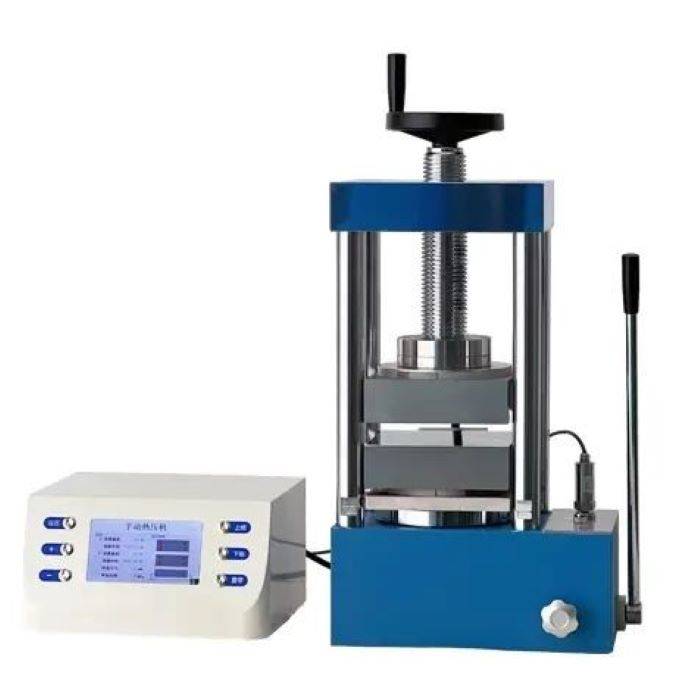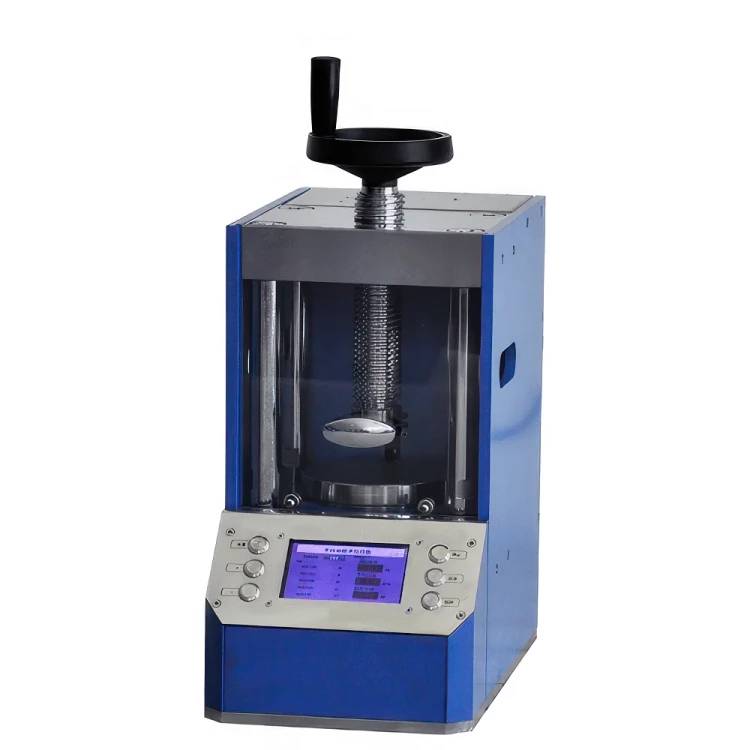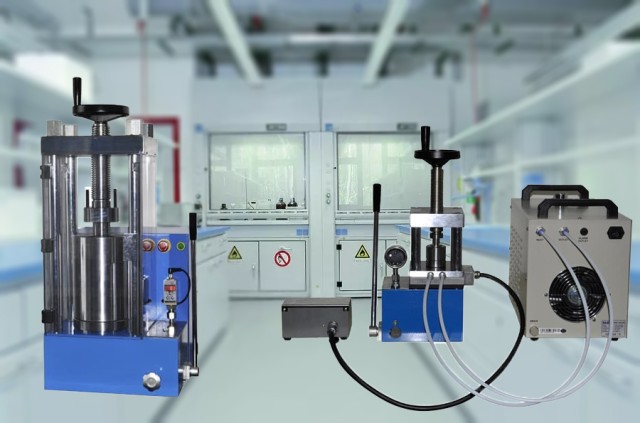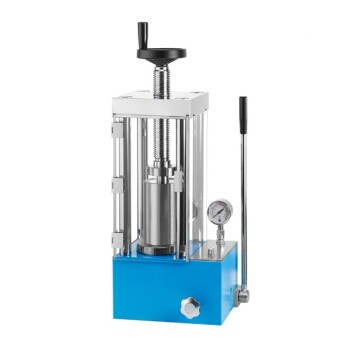Introduzione
Quando si parla di attrezzature da laboratorio, il tipo di pressa utilizzata può fare una differenza significativa nei risultati ottenuti. Le presse idrauliche e meccaniche sono due tipi di presse comunemente utilizzati, ciascuno con i propri vantaggi e svantaggi. Le presse idrauliche utilizzano cilindri idraulici per applicare la forza, mentre le presse meccaniche utilizzano una leva meccanica o una camma per applicare la forza. In questo post esploreremo le differenze tra presse idrauliche e meccaniche, i vantaggi di ciascun tipo e i fattori da considerare nella scelta del tipo di pressa più adatto al vostro laboratorio.
Indice dei contenuti
Differenze tra presse idrauliche e meccaniche
Per quanto riguarda le attrezzature da laboratorio, le presse idrauliche e le presse meccaniche sono due tipi di macchine utilizzate per applicare pressione ai materiali per vari scopi. Tuttavia, esistono differenze tra i due tipi di presse che li rendono più adatti a specifiche applicazioni. In questa sezione esamineremo le varie differenze tra presse idrauliche e meccaniche.
Fonte di alimentazione
La principale differenza tra presse idrauliche e meccaniche è la fonte di alimentazione. Le presse idrauliche utilizzano cilindri idraulici per applicare la forza, mentre le presse meccaniche utilizzano un motore e un volano per generare energia che viene trasferita al materiale attraverso un pistone. Questa differenza nella fonte di alimentazione influisce sul modo in cui la pressa applica la pressione al materiale.
Applicazione della forza
Le presse idrauliche sono in genere più potenti di quelle meccaniche e possono applicare la forza in modo più controllato. Le presse idrauliche possono applicare la forza su una corsa più lunga, il che le rende ideali per le operazioni di imbutitura e formatura. Le presse meccaniche, invece, applicano la forza su una corsa più breve, il che le rende più adatte alle operazioni di punzonatura, tranciatura e altre operazioni in cui è richiesta una forza elevata per un breve periodo di tempo.
Velocità
Le presse meccaniche sono generalmente più veloci delle presse idrauliche grazie al design del volano e del motore. Possono fornire un numero maggiore di colpi al minuto rispetto alle presse idrauliche, il che le rende più adatte alle operazioni di produzione di massa che richiedono un'elevata velocità di produzione. Tuttavia, le presse idrauliche sono più versatili e possono essere regolate per funzionare a velocità diverse in base ad applicazioni specifiche.
Manutenzione
Le presse idrauliche richiedono una maggiore manutenzione rispetto alle presse meccaniche a causa dei loro complessi sistemi idraulici. I sistemi idraulici devono essere controllati regolarmente per verificare l'assenza di perdite e di contaminazione del fluido e il fluido idraulico deve essere cambiato regolarmente. Le presse meccaniche, invece, sono più semplici e richiedono meno manutenzione.

Costo
Le presse idrauliche sono generalmente più costose di quelle meccaniche a causa dei loro complessi sistemi idraulici. Inoltre, richiedono una maggiore manutenzione, che va ad aggiungersi al costo complessivo di gestione. Le presse meccaniche sono generalmente meno costose e richiedono meno manutenzione, il che le rende un'opzione più conveniente per alcune applicazioni di laboratorio.
In conclusione, sia le presse idrauliche che quelle meccaniche presentano vantaggi e svantaggi. La scelta tra i due tipi di presse dipende in ultima analisi dalle esigenze specifiche del laboratorio e dai materiali da lavorare. Per le applicazioni che richiedono una forza e una precisione elevate, una pressa idraulica può essere la scelta migliore, mentre per le applicazioni che richiedono un'alta velocità e un basso costo, una pressa meccanica può essere sufficiente. È importante considerare attentamente le varie differenze tra presse idrauliche e meccaniche prima di decidere quale scegliere per il proprio laboratorio.
Vantaggi delle presse idrauliche
Le presse idrauliche stanno diventando sempre più popolari in laboratorio grazie ai loro numerosi vantaggi. In questa sezione, esamineremo i principali vantaggi dell'uso delle presse idrauliche rispetto a quelle meccaniche.
Generazione di forza elevata con uno sforzo minimo
Uno dei principali vantaggi delle presse idrauliche è la loro capacità di generare elevati livelli di forza con uno sforzo minimo. Ciò si ottiene grazie all'uso del fluido idraulico, che viene pressurizzato e utilizzato per muovere un pistone o uno stantuffo che esercita una forza sul materiale da testare. Rispetto alle presse meccaniche, le presse idrauliche offrono un'applicazione della forza più fluida e controllata, ideale per molte applicazioni di laboratorio.
Precisione e accuratezza
Le presse idrauliche sono note per la loro precisione e accuratezza, in quanto possono essere facilmente controllate per applicare una specifica quantità di forza in un determinato periodo di tempo. Questo le rende ideali per attività come le prove di compressione, dove la forza deve essere attentamente monitorata e controllata. Le presse idrauliche offrono anche la possibilità di applicare la forza a una velocità costante, ottenendo risultati di prova più accurati e coerenti.
Durata e bassa manutenzione
Un altro vantaggio delle presse idrauliche è la loro durata e i bassi requisiti di manutenzione. Le presse idrauliche hanno meno parti in movimento rispetto alle loro controparti meccaniche, il che le rende meno soggette a usura. Inoltre, le presse idrauliche non richiedono frequenti lubrificazioni o regolazioni, riducendo così i tempi e i costi di manutenzione.

La sicurezza
Le presse idrauliche offrono anche maggiori caratteristiche di sicurezza rispetto alle presse meccaniche. Ad esempio, le presse idrauliche sono dotate di protezione da sovraccarico, che impedisce alla pressa di superare la sua capacità di forza massima. Inoltre, le presse idrauliche sono progettate con dispositivi di sicurezza che impediscono all'operatore di entrare in contatto con la pressa durante il funzionamento.
In conclusione, le presse idrauliche offrono diversi vantaggi rispetto alle presse meccaniche, tra cui la generazione di una forza elevata con uno sforzo minimo, la precisione e l'accuratezza, la durata e la manutenzione ridotta e le funzioni di sicurezza avanzate. Questi vantaggi rendono le presse idrauliche la scelta ideale per molte applicazioni di laboratorio.
Vantaggi delle presse meccaniche
Le presse meccaniche offrono una serie di vantaggi che le rendono una scelta popolare nel settore del laboratorio. Di seguito sono elencati alcuni dei principali vantaggi delle presse meccaniche:
Versatilità e personalizzazione
Uno dei principali vantaggi delle presse meccaniche è la loro versatilità. Offrono un'ampia gamma di capacità di forza, che le rende adatte a una varietà di applicazioni di laboratorio. Possono anche essere personalizzate per adattarsi a requisiti specifici, consentendo una maggiore flessibilità in laboratorio.
Durata
Le presse meccaniche sono note per la loro durata. Sono costruite per resistere all'usura dell'uso quotidiano in laboratorio, il che le rende una scelta affidabile per l'uso a lungo termine.
Precisione e ripetibilità
Le presse meccaniche sono note per la loro accuratezza e ripetibilità, che garantiscono risultati coerenti e affidabili. Questo aspetto è particolarmente importante nelle prove di laboratorio, dove la precisione è essenziale.

Manutenzione minima
Le presse meccaniche richiedono una manutenzione minima, riducendo i tempi di inattività e aumentando la produttività. Questo aspetto è particolarmente importante in laboratorio, dove il tempo è spesso essenziale.
Facilità d'uso
Le presse meccaniche sono relativamente facili da usare, il che le rende accessibili a un'ampia gamma di personale di laboratorio. Ciò riduce la necessità di una formazione specializzata, consentendo un uso più efficiente delle risorse di laboratorio.
Coerenza e affidabilità
Le presse meccaniche offrono prestazioni costanti e affidabili, garantendo l'accuratezza dei risultati dei test. Questo aspetto è essenziale nelle prove di laboratorio, dove anche piccole variazioni nei risultati possono avere conseguenze significative.
Nel complesso, le presse meccaniche sono una scelta eccellente per i laboratori che richiedono apparecchiature affidabili, precise e versatili. Anche se le presse idrauliche possono offrire alcuni vantaggi in termini di capacità di forza e velocità, le presse meccaniche rimangono una scelta popolare per la loro durata, precisione e facilità d'uso.
Fattori da considerare nella scelta
Quando si sceglie tra presse idrauliche e meccaniche da laboratorio, è necessario considerare diversi fattori per garantire che venga selezionata la pressa giusta per le esigenze specifiche del laboratorio.
Tipo di materiali da testare
Uno dei fattori più importanti da considerare nella scelta tra presse idrauliche e meccaniche è il tipo di materiali da testare. Le presse idrauliche sono più adatte alle applicazioni ad alta pressione e sono quindi ideali per i materiali che richiedono una forza elevata. Le presse meccaniche, invece, sono più adatte ad applicazioni a bassa pressione e quindi ideali per materiali che richiedono una forza minore.
Forza e precisione richieste
Nella scelta tra presse idrauliche e meccaniche occorre considerare anche la forza e la precisione richieste. Le presse idrauliche offrono un'accuratezza e una precisione maggiori e sono quindi ideali per le applicazioni che richiedono un alto livello di precisione. Le presse meccaniche, invece, sacrificano l'accuratezza e la precisione a favore della velocità e dell'efficienza e sono quindi ideali per le applicazioni che richiedono tempi di lavorazione più rapidi.
Spazio disponibile
Nella scelta tra presse idrauliche e meccaniche occorre considerare anche lo spazio disponibile in laboratorio. Le presse idrauliche tendono ad essere più grandi e richiedono più spazio di quelle meccaniche. Se lo spazio è limitato, una pressa meccanica può essere l'opzione migliore.
Il budget
Il budget è un altro fattore importante da considerare nella scelta tra presse idrauliche e meccaniche. Le presse idrauliche tendono ad essere più costose di quelle meccaniche. Tuttavia, offrono un'accuratezza e una precisione maggiori, che le rendono ideali per le applicazioni che richiedono un alto livello di accuratezza. Le presse meccaniche sono generalmente più economiche, ma possono sacrificare l'accuratezza e la precisione.

In sintesi, nella scelta tra presse idrauliche e meccaniche da laboratorio, i laboratori devono considerare il tipo di materiali da testare, la forza e la precisione richieste, lo spazio disponibile e il budget. Valutando attentamente questi fattori e consultando esperti di apparecchiature, i laboratori possono assicurarsi di scegliere la pressa giusta per le loro esigenze.
Conclusione
In sintesi, sia lepresse idrauliche e meccaniche hanno vantaggi e svantaggi unici. Le presse idrauliche sono ideali per le applicazioni che richiedono un alto livello di forza e pressione, mentre le presse meccaniche sono ideali per le applicazioni che richiedono alta precisione e accuratezza. Nella scelta tra le due, è importante considerare fattori quali il materiale da pressare, la forza, la velocità e la precisione richieste, nonché il costo. In definitiva, la pressa giusta per il vostro laboratorio dipenderà dalle vostre esigenze e dai vostri requisiti specifici. Comprendendo le differenze tra i due tipi di presse, potrete prendere una decisione informata e scegliere quella che vi aiuterà a ottenere i migliori risultati.
Prodotti correlati
- Pressa manuale a caldo
- Presse idraulica manuale per pellet da laboratorio per uso in laboratorio
- Macchina per pressa idraulica riscaldata 24T 30T 60T con piastre riscaldate per pressa a caldo da laboratorio
- Pressa Idraulica Manuale per Pellet da Laboratorio per Uso in Laboratorio
- Macchina automatica per la pressatura di pellet idraulica da laboratorio per uso di laboratorio
Articoli correlati
- Che cos'è la pressa idraulica da laboratorio
- Uno sguardo alle presse idrauliche: Versatilità, efficienza e applicazioni industriali
- Comprendere la pressa per pellet idraulica: Meccanismo di funzionamento e applicazioni
- La scienza delle presse idrauliche e le loro applicazioni
- Pressa idraulica automatica: La guida definitiva per una preparazione efficiente dei campioni e dei processi industriali













